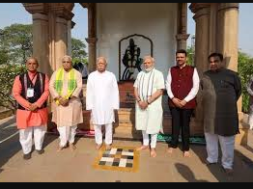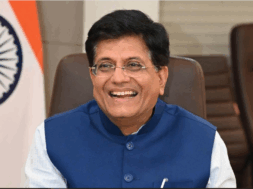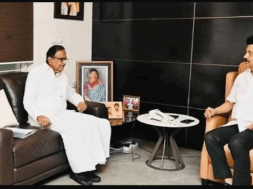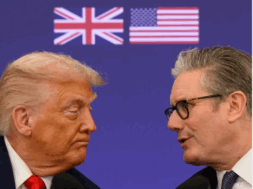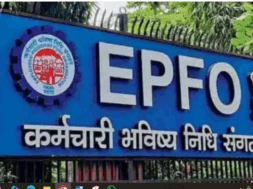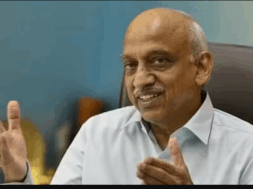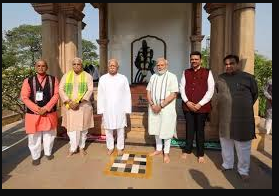
Modi Heaps Praises on RSS, Calls it “Banyan Tree of Immortal Culture and Modernisation”
Manas Dasgupta
NEW DELHI, Mar 30: Prime Minister Narendra Modi on Sunday heaped praises on the Rashtriya Swayamsevak Sangh (RSS) for its “service” across the nation calling the organisation a “banyan tree of immortal culture and modernisation.”
His remarks came while addressing a public gathering after laying the foundation stone for Madhav Netralaya Premium Centre in Nagpur the presence of RSS chief Mohan Bhagwat, Union Minister Nitin Gadkari and Maharashtra Chief Minister Devendra Fadnavis.
“The ideas that were seeded a hundred years back are before the world like a ‘vat vriksh’ (Banyan Tree) today. Principles and ideologies give it heights and the lakhs and crores of swayamsevaks are the branches of it. It is not a simple ‘vat vriksh,’ but RSS is the modern ‘akshay vat vriksh’ of India’s immortal culture (RSS is the modern, everlasting Banyan tree of India’s eternal culture.) This tree is energising the Indian culture and national consciousness,” Mr Modi said.
He also lauded the “vision” of the RSS and said “internal vision” has made Sangh a “synonym of service.” “Vision gives us direction. RSS is working for external as well as internal vision. Internal vision has made RSS a synonym of service. Where there is service, there is RSS,” he said.
“In Maha Kumbh we saw how RSS workers worked for lakhs of people, like a disciplined soldier RSS workers reach the spot of disaster-affected areas- be it floods, earthquakes, or cyclones. RSS workers do not see its pain, just get engrossed in the work of relief and service, Mr Modi added.
He said Triveni of Sanghatan (organisation), Samarpan (Dedication), and Seva (service) will give the energy and direction to the journey towards developed India, he said. “RSS’ years of effort and hard work are writing a new chapter of developed India. When RSS was established, from 1925 to 1947 was a period of struggle. After 100 years of hope, the country is at a crucial juncture, 2025 to 2047 is an important period for development.” “Youth has made ‘Make in India’ successful, it has become vocal for locals. The same youth will hold the flag of developed India in 2047 when India will be celebrating its 100th year of independence,” Mr Modi added.
He also made reference to the ongoing Operation Bramha, which is being carried out in aid of earthquake-stricken Myanmar. “When Covid-like situation comes, India treats the world as a country and ensures that vaccines are available. We stand whenever other countries in the world need us. Yesterday, India under Operation Bramha reached first with relief work in Myanmar when they suffered from an earthquake. Similar was the case with the Nepal and Turkey earthquakes. India never fails to help. During war-like situations, we ensure to rescue our citizens from the other countries,” he said.
“The world is watching, when India is progressing, it is becoming the voice of the global south. Our biggest treasure is youth, risk-taking capacity has increased, innovating new things and making a mark in the world of startups. They are proud of their culture and traditions. We saw in Maha Kumbh, that youth reached in lakhs and felt proud of the Sanatan tradition.”
RSS workers are working on over 1,50,000 lakh projects selflessly, the organisation’s chief Mohan Bhagwat said. They are doing service without expecting anything in return. The vision required in life is to make life meaningful and healthy, using the situations of our lives is seva. In the context of Sangh, one hour at the shakha (RSS office) for self-growth and 23 hours for the people’s welfare is the vision of life, he added.
The Prime Minister said “cruel attempts” were made to finish the national conscience of India. “Our Yoga and Ayurveda have got a new identity in the world. A nation’s existence depends on its cultural expansion and the expansion of national conscience. If we look at the history of our country, such cruel attempts were made to eliminate our national conscience, but no one succeeded. It all happened because even in the difficult times, many social movements took place,” he said.
Mr Modi moved on to speak of the saints, whose thinking “gave energy to National consciousness. Gurunaka, Kabir das, Sant Tukaram, Sant Namdev, and others. Their principle broke the walls of discrimination and weaved into a thread of unity.”
After laying the foundation stone for the Madhav Netralaya Premium Centre at Nagpur, Mr Modi said in the country, even the most vulnerable should receive healthcare. The senior citizen should not be stressed over receiving healthcare, and that is the vision of the government. Crores of people are receiving free healthcare due to Ayushman Bharat, and thousands of Jan Aushadhi centres are providing medicines at a reasonable cost, he added.
After arriving in Nagpur, Mr Modi visited RSS founder Dr Keshav Baliram Hedgewar’s memorial in Nagpur and paid floral tribute to him. RSS chief Mohan Bhagwat was also present on the occasion. The memorials of Hedgewar and M.S. Golwalkar, who was the second leader of the RSS, are located at the Dr Hedgewar Smruti Mandir in Nagpur’s Reshimbagh area.
Mr Modi also signed the visitor’s book after paying tribute to RSS founder Keshav Baliram Hedgewar at RSS’ Smruti Mandir. In his tribute, the Prime Minister termed Hedgewar and Golwalkar as the two strong pillars of RSS — the ideological parent of the BJP.
PM Modi wrote that he was overwhelmed on visiting Smruti Mandir and that the site gives inspiration to work for the nation. He also said Hedgewar and Golwalkar were a source of energy for lakhs of RSS Swayamsevaks.
During his visit to Nagpur, Mr Modi visited Deekshabhoomi, where Ambedkar embraced Buddhism along with his followers in 1956. He went inside the stupa at the Deekshabhoomi and paid homage to Ambedkar’s ‘asthi’ (mortal remains) kept there.
In his message penned in Hindi in the visitors’ diary at the venue, Mr Modi said, “I am overwhelmed that I got an opportunity to visit Deekshabhoomi, one of the five ‘Panchthirth’ of Dr Babasaheb Ambedkar, in Nagpur. One can feels Babasaheb’s principles of social harmony, equality and justice in this holy atmosphere here.” He further said Deekshabhoomi energises people to move ahead with a system of equal rights and justice for the poor, less privileged and the needy.
“Deekshabhoomi in Nagpur stands tall as a symbol of social justice and empowering the downtrodden. Generations of Indians will remain grateful to Dr Babasaheb Ambedkar for giving us a Constitution that ensures our dignity and equality. Our Government has always walked on the path shown by Pujya Babasaheb and we reiterate our commitment to working even harder to realise the India he dreamt of,” PM Modi posted on X.
“I have full faith that in this Amrit Kaalkhand, we will take the country to new heights of progress with the values and teachings of Babasaheb Ambedkar. Building a developed and inclusive Bharat will be the true tribute to Babasaheb,” Mr Modi added.
Later during his visit to Chhattisgarh, Mr Modi laid the foundation stone of several projects and also inaugurated multiple development projects of more than ₹33,700 crore related to various sectors. Mr Modi also flagged off the MEMU train service in the Abhanpur- Raipur section via Mandir Hasaud and handed over the keys (replica) of houses to three beneficiaries under the Pradhan Mantri Awas Yojana-Gramin (PMAY-G).
PM Modi laid the foundation stone of NTPC’s Sipat Super Thermal Power Project Stage-III (1x800MW), located in the Bilaspur district of over ₹9,790 crore. This pit head project is based on the latest state-of-the-art Ultra-Supercritical Technology with high power generation efficiency.
Just hours before Mr Modi’s visit to Chhattisgarh, 50 Maoists, including 14 with a cumulative reward of ₹68 lakh on their heads, surrendered in Bijapur district on Sunday, a police official said. “They laid down arms in front of senior officials of the state police and the Central Reserve Police Force (CRPF),” he added.
“They surrendered citing the hollow and inhuman Maoist ideology, exploitation of tribals by senior cadres of the outlawed Communist Party of India (Maoist) as well as differences brewing within the movement. They are also impressed by security forces setting up camps and the ‘Niya Nellanar’ (your good village) scheme under which forces and the administration are providing basic amenities in remote areas,” Bijapur Senior Superintendent of Police Jitendra Kumar Yadav said.
Mr Modi also inaugurated an airstrip for Unarmed Aerial Vehicles (UAVs) and a facility for testing loitering munition, in Nagpur. He inaugurated the newly-built 1250 metre long and 25 metre wide airstrip for UAVs and the live munition and warhead testing facility to test the Loitering Munition and other guided munitions. Modi also visited the Solar Defence and Aerospace Limited’s ammunition facility in Nagpur.
